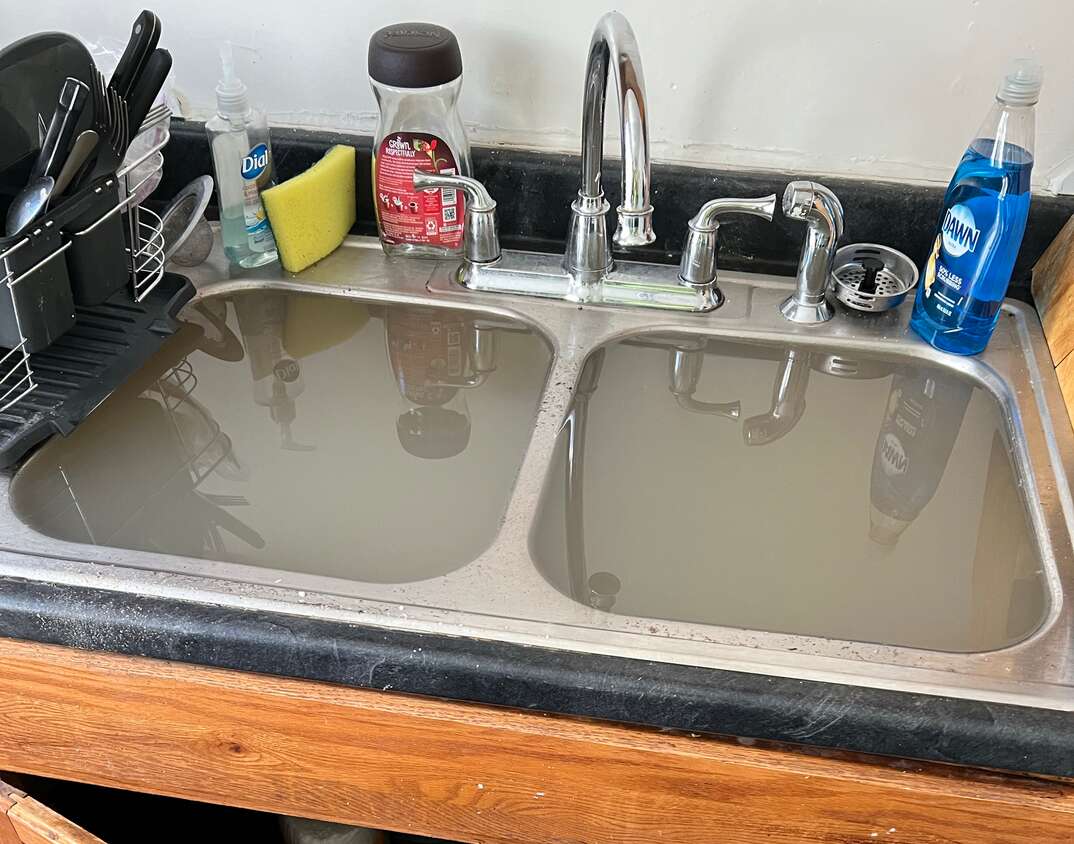- AppliancesElectriciansHVACLandscapingLocksmithPest ControlPlumbingRenovationRoofingT V RepairAll Home Improvement
- Car AccidentClass ActionCorporate LawCriminal DefenseDivorce LawEmployment LawFamily LawFinancial LawLegal AidMedical Injury LawyersMedical MalpracticeReal Estate LawWater Fire RestorationAll Legal
- InvestmentRetirementAll Finance
- Animal InsuranceAutoGeneral InsuranceHealth PolicyHome RentersAll Insurance
- DentalHealth SpecialistsAll Medical
- Animal CareVeterinaryAll Pets
- Auto GlassTowingAll Automotive
What to Do if Your Sewer Backs Up

As a homeowner, it's completely normal for a single drain in your home to become clogged or back up every once in a while. However, a backed-up sewer line is a completely different animal, and you'll need to act fast and call a plumber immediately.
When a sewer line backs up, it can affect multiple drains in your home at the same time, sometimes leading to flooding, water damage and a host of plumbing issues. Here's how to handle a sewer line backup and how to prevent potential backups in the future.
The main cause of a sewer backup is a clog or blockage that occurs in a home's underground sewer line. Plumbing issues that can lead to backups include foreign objects that make their way into drain pipes, grease, food or hair buildup in pipes and hard water sediment that creates pipe blockages. When these blockages travel deep into the underground sewer line, water flow can become hindered and back up into several drains at once.
Tree root invasion is another common issue that can wreak havoc on your plumbing system and cause sewer pipe backups. When underground pipes become weakened due to normal wear and tear, aging or ground shifts, it makes them vulnerable to small cracks and holes. Tree roots are naturally drawn to the moisture that leaks out from these small abrasions, and the roots can work their way into the pipes. When this happens, the roots eventually expand and create blockages. With a tree root invasion, you may notice standing water in sinks or tubs and gurgling sounds coming from your pipes or toilet.
What Should You Do If Your Sewer Backs Up?
If your sewer backs up, the first thing you'll want to do is schedule emergency plumbing service. Raw sewage and sewer gas can be dangerous and lead to illness. Before your plumber arrives, you can follow these steps to get the ball rolling and potentially prevent further damage.
Step 1: Put on Protective Gear
If your basement or other rooms in your home are flooded with sewage water, it's important to protect yourself from potentially toxic chemicals. If you have a face mask, use this to cover your mouth. Wear protective footwear and rubber gloves if you must wade through any water or touch anything that's come in contact with the sewage.
Step 2: Shut Off the Water Supply
Find your home's main water shut-off valve and shut off the water. Your shut-off valve should be located inside the garage or by your water heater. If you can't locate the water valve, wait for the plumber for assistance.
Step 3: Shut Off the Electricity
If you can do so without risking electric shock, shut off the electricity for your entire home or for the affected rooms or areas. This can help reduce the risk of injury if there's any standing water.
Step 4: Don't Use Plumbing Fixtures
While waiting for your plumber, avoid flushing the toilet and using the shower or faucets. This should be easy if your water is already turned off, but toilets usually have a flush or two left after the shut-off process. Running water and flushing toilets during a sewer line backup can worsen the situation.
Step 5: Wait Outside for the Plumber to Arrive
If possible, wait outside in the fresh air for your plumber to arrive. High levels of sewer gas can be toxic and flammable, so you'll want to evacuate your home as quickly as possible.
More Related Articles:
Calling a Plumber? Here Are the 6 Most Common Plumbing Jobs and How Much They Cost
6 Ways to Try to Unclog Your Sink Before You Call a Plumber
Here's How Much It Costs to Remodel a Bathroom
While not all sewer backups are completely preventable, there are some proactive steps you can take to reduce future risks. If your plumbing system is on the older side, schedule a plumbing inspection so your plumber can inspect your sewer line and other underground pipes. If they detect any issues like cracks or weak spots, they can replace or reinforce your system to prevent backups due to damaged pipes. Here are some more tips to follow that may help prevent clogged pipes and sewage backup:
- Avoid pouring kitchen grease down drains.
- Install backflow preventer valves or standpipes in all lower-level drains.
- Only flush toilet tissue; don't flush wipes, sanitary napkins, paper towels, etc.
- Contact a plumber at the first sign of a potential drain issue.
Elocal Editorial Content is for educational and entertainment purposes only. Editorial Content should not be used as a substitute for advice from a licensed professional in your state reviewing your issue. Systems, equipment, issues and circumstances vary. Follow the manufacturer's safety precautions. The opinions, beliefs and viewpoints expressed by the eLocal Editorial Team and other third-party content providers do not necessarily reflect the opinions, beliefs and viewpoints of eLocal or its affiliate companies. Use of the Blog is subject to the
Website Terms and Conditions.The eLocal Editorial Team operates independently of eLocal USA's marketing and sales decisions.



